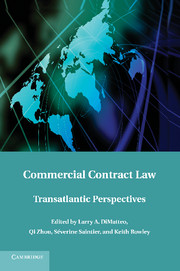Book contents
- Commercial Contract Law
- Commercial Contract Law
- Copyright page
- Dedication
- Brief Contents
- Contents
- Contributors
- Foreword
- Part I The Role of Consent
- Part II Normative Views of Contract
- Part III Contract Design and Good Faith
- Part IV Implied Terms and Interpretation
- Part V Policing Contracting Behavior
- Part VI Misrepresentation, Breach, and Remedies
- Part VII Harmonizing Contract Law
- Index
Part I - The Role of Consent
Published online by Cambridge University Press: 05 February 2013
- Commercial Contract Law
- Commercial Contract Law
- Copyright page
- Dedication
- Brief Contents
- Contents
- Contributors
- Foreword
- Part I The Role of Consent
- Part II Normative Views of Contract
- Part III Contract Design and Good Faith
- Part IV Implied Terms and Interpretation
- Part V Policing Contracting Behavior
- Part VI Misrepresentation, Breach, and Remedies
- Part VII Harmonizing Contract Law
- Index
Summary
This chapter opens by noting the bewildering array of contract theories that appear to exist in Anglo-American law, contrasting this with the essentially uniform contract theory of the mixed legal system of Scotland. The question posed is whether there is any way through the jungle of competing theories, and whether any consensus is emerging as to the way forward. In answering those questions, the chapter proceeds by considering three major issues: (1) Do any one of the competing theories of contract law describe the law as it is actually formed and applied? Any of those that fail to do so should not be given significant scholarly attention. (2) Do what seem like competing theories actually possess various degrees of commonality? (3) In terms of the recognition of underlying commonalities, is there an emerging consensus as to how an ideal, harmonised, cross-national contract law might take shape? This undertaking will rely heavily on provisions of both the American Restatement (Second) of Contracts and the Draft Common Frame of Reference (DCFR).
The competing major contract theories of contract that will be considered include (1) contract as an exchange of promises; (2) contract as an agreement in fact; (3) contract as based upon the reasonable expectations or reliance of the parties (consequentialism); (4) contract as based upon the assumption by the parties of legally binding obligations; (5) contract as based upon the relationship or status of the parties, such as in an agency or trust relationship; and (6) contract as based upon a transfer of rights between the parties. Each theory will be reviewed for their strengths and weaknesses. The author asserts that only the first two have engendered any widespread adherence by courts, and thus are the only two that can seriously claim to reflect a broad-based understanding of the basis for contract law. The others, while attracting occasional support from courts, have largely been the preserve of academic scholarship. The one exception is the impact of reliance theory on certain areas of contract law.
The chapter also analyses the competing theories of contract in reference to the poles of will/autonomy and consequence/effect. However, such a metric does not properly explain transfer theories of contract law. Such theories are best understood by referencing a third pole, characterised by the content and rights of the contract relationship. The chapter suggests that some theories can be grouped as different views of the same rationale. For example, will theory (promise), agreement, and assumption of obligation should be merged through a revitalised will theory. This new will theory would be based upon the idea that contract is an expression of the parties’ will by which they assume, through the medium of agreements or promises, obligations having their source in the normative power of the state.
The final part of the chapter suggests that a consensus is merging in Europe as to the proper characterisation of contract law, as an emanation of the parties’ wills in terms of agreement plus intention to be bound as found in the DCFR and the Principles of European Contract Law (PECL). In contrast, such a consensus has not been firmly established in US common law. The doctrine of consideration and the current American view of privity present obstacles for a purely intention-based theory of the common law. Projects like the DCFR present opportunities to reconsider the reach of the doctrine of consideration and third party rights (privity).
- Type
- Chapter
- Information
- Commercial Contract LawTransatlantic Perspectives, pp. 1 - 82Publisher: Cambridge University PressPrint publication year: 2013



